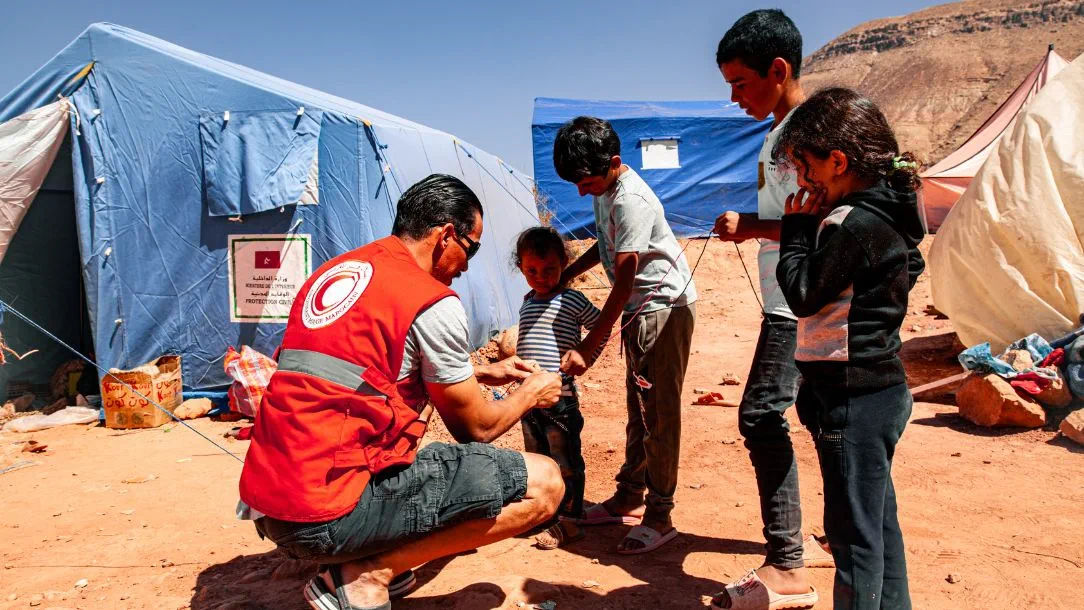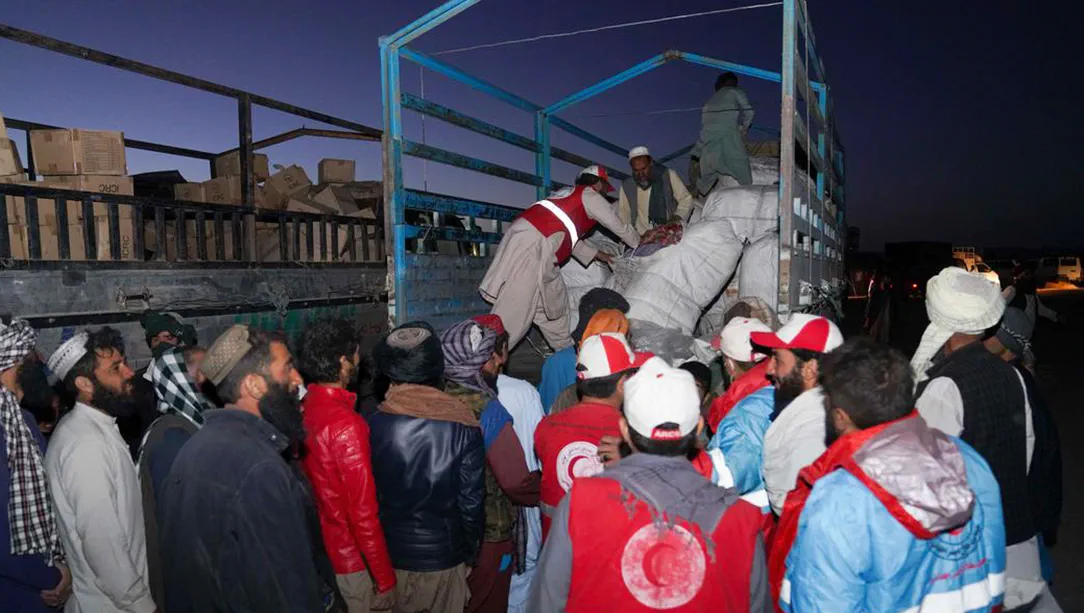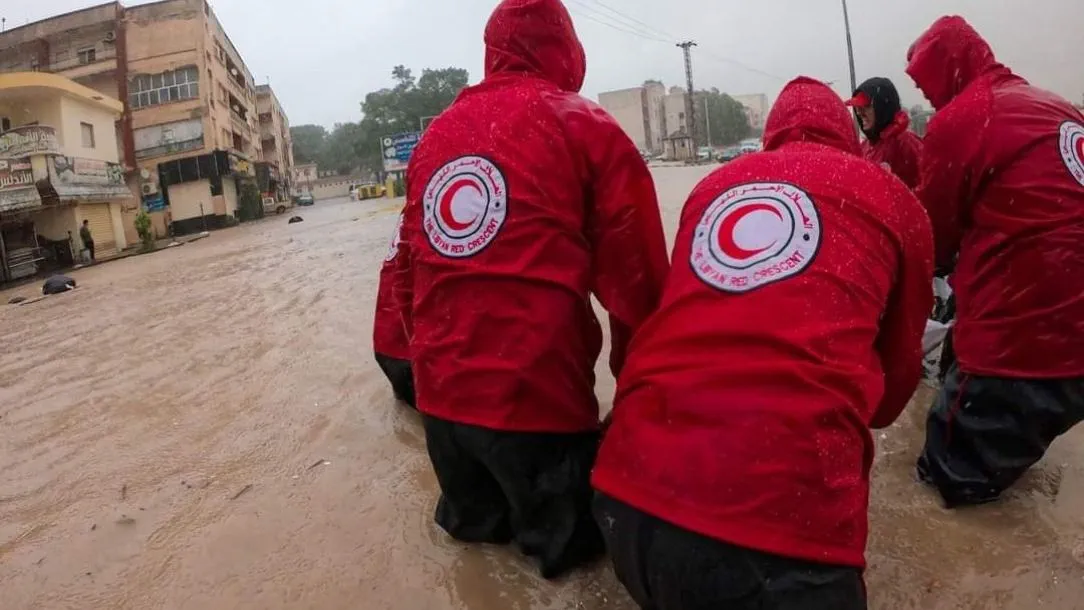Morocco earthquake 2023: Red Cross Red Crescent response
On 8 September 2023, Morocco was hit by a powerful earthquake. Homes and livelihoods were destroyed in minutes. One year on, people are starting to rebuild their lives

Buildings crumbled and collapsed near the epicentre in the High Atlas Mountains. PHOTO: Moroccan Red Crescent.
Last updated 5 September 2024
- 6.8 magnitude earthquake struck on 8 September 2023
- In total, 2,946 people were killed and 600,000 people were affected
- 380,000 people were left permanently or temporarily without shelter
On 8 September 2023, a 6.8 magnitude earthquake struck Morocco, causing widespread destruction. Thousands of people lost their lives and many more lost livelihoods, homes and loved ones.
Moroccan Red Crescent teams responded from day one, providing practical support such as food and shelter, and emotional support to the many traumatised people affected by the earthquake.
Since then, the Moroccan Red Crescent, with support from the Red Cross Red Crescent Movement, has:
- distributed more than 64,000 relief items to more than 90 villages
- delivered first aid and psychosocial support to more than 50,000 people
- distributed food to more than 6,500 homes across 122 villages
- installed over 300 shelter units, and supported 18,788 people with shelter and housing assistance.
Morocco earthquake: what happened?
The epicentre of the earthquake was in Morocco’s high-altitude Atlas Mountains. The earthquake hit just after 11pm local time as many slept. Buildings collapsed and some villages near the epicentre were almost completely destroyed, including Tafeghaghte, 37 miles from Marrakesh.
Moroccan Red Crescent teams supported search and rescue operations and provided emergency medical care and psychosocial support.
The British Red Cross launched an appeal to support humanitarian needs in the area.
"“The earthquake that struck the Moroccan High Atlas Mountain range one year ago, devastated lives and destroyed homes in a matter of minutes, but this damage that will take years to recover from," said Gabriel Karlsson, country cluster manager for the Middle East and North Africa. "The Moroccan Red Crescent Society, with support from the Red Cross and Red Crescent Movement, has been responding since the early aftermath of the earthquake, particularly in the hardest to reach areas. One year on, they continue to work alongside communities to help them to recover and rebuild, and they will continue to be there, for as long as they're needed.”

Map of the Morocco earthquake affected areas: the epicentre of the Morocco earthquake started in the Al Haouz region, 44 miles from Marrakesh.
How have communities in Morocco been affected?
As well as the High Atlas Mountains, the city of Marrakesh was also impacted, and building collapses resulted in many casualties.
At least 530 schools were damaged, affecting the education of 100,000 children. It's estimated that 600,000 people were directly affected, with 380,000 of those temporarily or permanently homeless.
Other challenges included inadequate shelter, overcrowding, and lack of sanitation.

Moroccan Red Crescent teams transporting badly injured people to hospital. PHOTO: Moroccan Red Crescent
How has the Red Cross and Red Crescent Movement supported people in Morocco?
Moroccan Red Crescent teams were on the ground immediately after the earthquake struck and have since deployed over 700 personnel, including 300 staff and volunteers who initially provided emergency support, and a further 100 to scale up the operation in the weeks and months after.
This included:
- search and rescue
- medical caravans which travelled to remote villages to provide medical and psychosocial support
- blood donation drives
- provision of toilets and showers
- road repairs to enable access to communities
Moroccan Red Crescent Society teams also replaced destroyed schools with temporary containers and supported older children to access dormitories in larger cities to enable them to continue their education.
How can I help support people affected by the earthquake in Morocco?
Money donated to our disaster fund will help ongoing relief, as well as longer-term aid for those affected.
When was Morocco's last earthquake?
At just 11 miles deep, the 2023 earthquake became the deadliest earthquake to hit the country since 2004, when the Al Hoceima quake killed more than 600 and left up to 15,000 homeless.
The head of the National Institute of Geophysics in Morocco said that the 8 September earthquake was the strongest in a century.
While Morocco is not on a tectonic plate, it's close to a complex web of active faults that run through the High Atlas mountain range.
Related stories
You may also be interested in

Morocco earthquake: one month on
A month on from the devastating 6.8 magnitude earthquake, which struck the High Atlas Mountains and Marrakesh, and communities are starting the long road to recovery.

Afghanistan earthquake: thousands affected in Herat province
A deadly earthquake has killed more than 2,000 people in Herat, Afghanistan and left many families homeless.

Libya floods 2023: thousands die after Storm Daniel causes catastrophic flooding
Floods in Libya have left thousands of people dead and destroyed thousands and homes. Find out more about the devastating flooding and how the Red Cross is helping.


